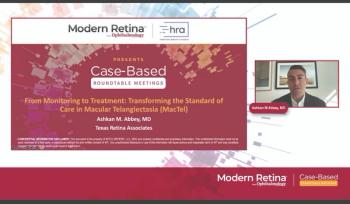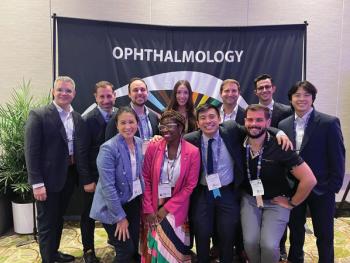
4DMT presents injection-free subgroup analyses from Phase 2 PRISM randomized dose expansion cohort in wet AMD
Injection-free subgroup results demonstrated that a single intravitreal dose of 4D-150 without any supplemental anti-VEGF injections resulted in stable mean visual acuity that was equal to or higher than the standard bimonthly aflibercept control group at all 6 time points through Week 24.
4D Molecular Therapeutics presented supplemental aflibercept injection-free subgroup analyses of the previously reported 24-week landmark results from the randomized dose expansion cohort from the Phase 2 PRISM clinical trial evaluating intravitreal 4D-150 in
The data were presented at Clinical Trials at the Summit 2024 in Park City, Utah, by Carl Danzig, MD, of the Rand Eye Institute in Deerfield Beach, Florida.
According to the company, 4D-150 combines its intravitreal vector, R100, and a transgene cassette that expresses both aflibercept and a VEGF-C inhibitory RNAi. 4D-150 is designed for single, low-dose intravitreal delivery for transgene expression from the retina without significant inflammation.1
Robert Kim, MD, chief medical officer of 4DMT, pointed out in a news release the injection-free subgroup analyses demonstrate the potential for a single intravitreal 3E10 vg dose of 4D-150 to improve and stabilize retinal anatomy while improving or stabilizing vision in the most severe form of wet AMD with the highest VEGF treatment burden, without the need for any supplemental treatment through 24 weeks in the majority of patients treated.
“4D-150 to date has shown robust clinical activity with a favorable safety profile, and the data provide additional evidence that 4D-150 has the potential to treat all patients suffering from wet AMD,” Kim said. “We look forward to sharing interim results from the Population Extension cohort of PRISM at ASRS in July 2024, and an update on our Phase 3 clinical trial design in the third quarter of 2024.”
The Phase 2 PRISM supplemental injection-free subgroup analyses found:
- Stable visual acuity observed through Week 24 in both 4D-150 dose groups (n=22 injection-free patients); BCVA equal to or numerically higher than bimonthly aflibercept (n=10 patients) at all six time points through Week 24.
- High dose (3E10 vg/eye; n=12 patients):
- Sustained reduction and stabilization of CST fluctuations compared to bimonthly aflibercept at all six timepoints through Week 24
- The average mean change from baseline in CST at Weeks 20 and 24 was -52.2 mm in the 3E10 vg/eye group and -21.4 in the aflibercept group (mean difference, -30.8 mm)
Upcoming 4D-150 Milestones
The company also announced that initial interim 24-week landmark analysis of the Phase 2 PRISM population extension cohort (N=32) in the broader wet AMD patient population will be presented at the ASRS Annual Meeting on July 17, 2024.
The company also is conducting Phase 3 planning, with an update on Phase 3 clinical trial design expected in Q3 2024, and the first Phase 3 clinical trial initiation expected in Q1 2025.
Reference:
4DMT Presents Injection-Free Subgroup Analyses from 4D-150 Phase 2 PRISM Randomized Dose Expansion Cohort in Wet AMD Patients with Severe Disease Activity & High Treatment Burden at the Clinical Trials at the Summit 2024 Meeting | 4D Molecular Therapeutics. 4D Molecular Therapeutics. Published 2024. Accessed June 10, 2024. https://ir.4dmoleculartherapeutics.com/news-releases/news-release-details/4dmt-presents-injection-free-subgroup-analyses-4d-150-phase-2
Newsletter
Keep your retina practice on the forefront—subscribe for expert analysis and emerging trends in retinal disease management.












































